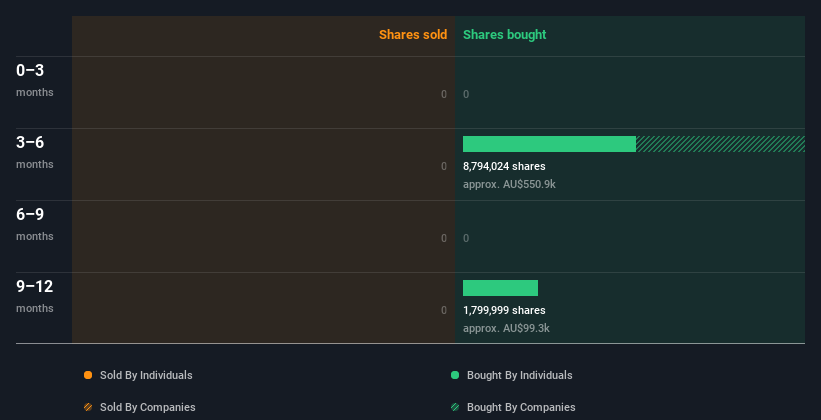Insider Buyers Lose AU$51k As ReadCloud Sheds AU$1.0m
The recent 12% drop in ReadCloud Limited's (ASX:RCL) stock could come as a blow to insiders who purchased AU$348.6k worth of stock at an average buy price of AU$0.058 over the past 12 months. Insiders buy with the expectation to see their investments rise in value over a period of time. However, recent losses have rendered their above investment worth AU$298.0k which is not ideal.
While we would never suggest that investors should base their decisions solely on what the directors of a company have been doing, we would consider it foolish to ignore insider transactions altogether.
See our latest analysis for ReadCloud
ReadCloud Insider Transactions Over The Last Year
Over the last year, we can see that the biggest insider purchase was by Independent Non-Executive Director Paul Collins for AU$80k worth of shares, at about AU$0.06 per share. So it's clear an insider wanted to buy, even at a higher price than the current share price (being AU$0.05). It's very possible they regret the purchase, but it's more likely they are bullish about the company. To us, it's very important to consider the price insiders pay for shares. It is generally more encouraging if they paid above the current price, as it suggests they saw value, even at higher levels.
While ReadCloud insiders bought shares during the last year, they didn't sell. The chart below shows insider transactions (by companies and individuals) over the last year. If you want to know exactly who sold, for how much, and when, simply click on the graph below!
There are always plenty of stocks that insiders are buying. So if that suits your style you could check each stock one by one or you could take a look at this free list of companies. (Hint: insiders have been buying them).
Insider Ownership
Looking at the total insider shareholdings in a company can help to inform your view of whether they are well aligned with common shareholders. Usually, the higher the insider ownership, the more likely it is that insiders will be incentivised to build the company for the long term. It appears that ReadCloud insiders own 31% of the company, worth about AU$2.3m. This level of insider ownership is good but just short of being particularly stand-out. It certainly does suggest a reasonable degree of alignment.
So What Does This Data Suggest About ReadCloud Insiders?
It doesn't really mean much that no insider has traded ReadCloud shares in the last quarter. However, our analysis of transactions over the last year is heartening. Insiders do have a stake in ReadCloud and their transactions don't cause us concern. In addition to knowing about insider transactions going on, it's beneficial to identify the risks facing ReadCloud. To help with this, we've discovered 4 warning signs (2 don't sit too well with us!) that you ought to be aware of before buying any shares in ReadCloud.
Of course, you might find a fantastic investment by looking elsewhere. So take a peek at this free list of interesting companies.
For the purposes of this article, insiders are those individuals who report their transactions to the relevant regulatory body. We currently account for open market transactions and private dispositions of direct interests only, but not derivative transactions or indirect interests.
Have feedback on this article? Concerned about the content? Get in touch with us directly. Alternatively, email editorial-team (at) simplywallst.com.
This article by Simply Wall St is general in nature. We provide commentary based on historical data and analyst forecasts only using an unbiased methodology and our articles are not intended to be financial advice. It does not constitute a recommendation to buy or sell any stock, and does not take account of your objectives, or your financial situation. We aim to bring you long-term focused analysis driven by fundamental data. Note that our analysis may not factor in the latest price-sensitive company announcements or qualitative material. Simply Wall St has no position in any stocks mentioned.

 Yahoo Finance
Yahoo Finance 
